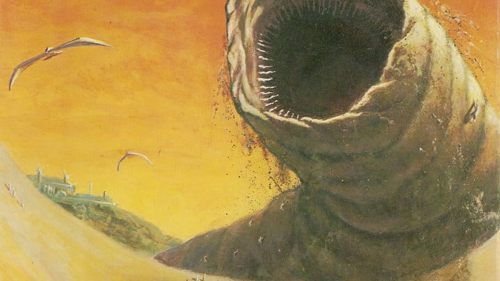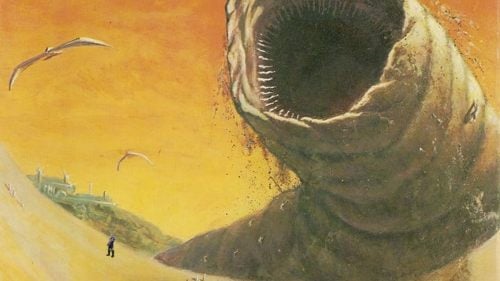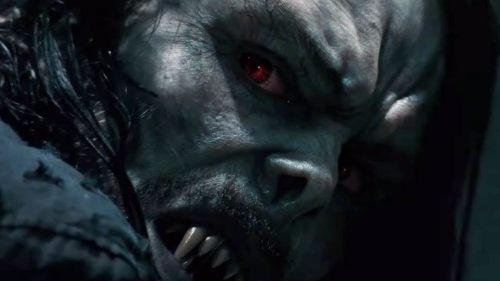BLADE RUNNER 2049: Is Niander Wallace A Replicant?
Warning: This post contains Blade Runner 2049 spoilers.
We first meet savior industrialist Niander Wallace (Jared Leto) during a meeting with the LAPD during Nexus Dawn, the Blade Runner 2049 prequel that takes place in 2036. Following numerous rebellions, Replicant technology has been banned. In 2022, a massive EMP explosion wiped out most of the world's data, setting the planet back to zero in terms of its recorded history. Almost immediately after, enviromental disasters led to widespread famine. From the darkness, Wallace emerged -- a figure of light who strove to provide food for the world's hungry, almost single-handedly lifting the human race up on his narrow shoulders, delivering it from extinction.
In Nexus Dawn, Niander proposes that a new line of Replicants are the next step toward stabilizing Earth, and helping human beings move forward, as the synthetics represent the slave labor needed to not only re-establish the pieces of the world that were lost to numerous disasters (both natural and manmade), but also for colonizing planets beyond his own.
But is Niander Wallace human?
That's the question that's bothered this writer since first sitting down with Blade Runner 2049 -- a movie that introduces just as many mysteries as Ridley Scott's inconic '82 sci-fi landmark. Not only does Denis Villeneuve's cyberpunk sequel refuse to answer the original's most burning question ("Is Rick Deckard a Replicant?"), it wrestles with uncertainties that will probably never be definitively answered. The fact that the human race is rescued by a literal slaver is one of the more brazen story points in the series, made even more complicated by the fact that Wallace then embarks on a quest (recovering the Replicant "Christ Child" conceived by Deckard and his forbidden "skin job" lover, Rachael [Sean Young]) that may ultimately doom the species whose eradication he just blocked.
Niander's clouded eyes are both the argument for and against his human nature, as he's blinded (possibly by the "affliction" he mentions in Nexus Dawn), but still able to see, thanks to an implant that Luv (Sylvia Hoeks) -- his right hand Replicant woman -- plugs into his neck. Through this robotic extension, Niander is able to summon black, hovering drones, which float and monitor his surroundings, allowing Wallace to process images in his brain. One could argue that Niander is simply a human who's rich and invested in emerging technology, utilizing a protoype to better his days (marking him as 2049's version of the nefarious "tech bro" stereotype that's permeated modern pop culture as of late). On the other hand, we never see another human being with these so called "upgrades", begging the viewer to consider this lack of textual evidence as support of Niander either being a Replicant himself, or simply the exception to our established rule of humanity due to his class status.
Furthermore, there's a motivational issue regarding Niander and his quest to discover the Replicant "Christ Child" that's been born from Rachael's womb. While its evident (both from Nexus Dawn and the opening titles of 2049), that Wallace is the supreme profiteer of this universe, he must recognize (as Madame Joshi [Robin Wright] does) that the discovery of Replicants' ability to reproduce may lead to a full blown revolution and annhilation of the human species. Though he is a slaver, and admits he can only make "so many" Replicants with which to explore other worlds and perform the labor humans do not desire to do any longer, the preservation of this child (as opposed to letting Officer K [Ryan Gosling] destroy it) could only better his business and resulting wealth for so long. These riches come with their own price tag: the annihilation of the people, which its difficult to comprehend Wallace would desire at all. After all, there would be no demand for Replicants, should there be no one left to sell them to.
Or has Wallace simply moved beyond humanity entirely, embracing robotics (including his own implants) as the next step in evolution? Perhaps he is neither human nor Replicant, but a being who identifies as a God-like entity, passing judgement over who lives and dies in the world he endeavored to rescue from oblivion. The destruction of humans would only clear the path for a new world, with its own unique power structures that he gets a voice in defining. This is what renders him (and Leto's breathy, detached performance) so utterly fascinating: Niander Wallace fully embodies a being of transcendence, his physical vision permanently lost, replaced by one for a future in which he is among the dominant post-human kind.



